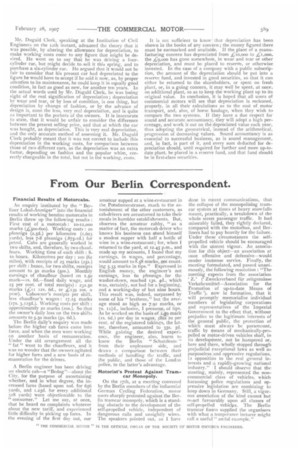From Our Berlin Correspondent.
Page 25

If you've noticed an error in this article please click here to report it so we can fix it.
Financial Results of Motorcabs.
An enquiry instituted by the " Berliner Lokal-Anzeiger" into the financial results of working benzine motorcabs in Berlin threw up the following results : First cost of a motorcab ; 10-12,000 marks (oci-600). Working costs : zo pfennigs (2.5d.) per kilometre (1,603 yards), less 7-8 pfennigs (.875-Id.) for petrol. Cabs are generally worked in two shifts, and, therefore, by two chauffeurs. Working time of each shift : 810 hours. Kilometres per day : too (62 miles), with receipts of 25 marks (ass.) per shift ; hence, for two shifts, receipts amount to 5o marks (5os.). Monthly earnings of chauffeur (based on 1.5o mark—is. 64.—fixed daily wage, and 25 per cent. of total receipts) : 232.50 marks (iii 12s. 6d., or L;139 los. year). Cabowner's receipts per shift, less chauffeur's wages : 17.25 marks (175. 3.1254.). Working costs per shift : approximately 20 marks (2os.). So that the owner's daily loss on the two shifts amounts to 5.5o marks (5s. 6d.).
The Berlin daily's enquiry was made before the higher cab fares came into force, arid when the men were working on another basis of remuneration. Under the old arrangement all the " fat " went to the chauffeurs, and it was no wonder that the owners agitated for higher fares and a new basis of remuneration for the drivers.
A Berlin engineer has been driving an electric cab—a "Bedag"—about the City, for the purpose of ascertaining whether, and in what degree, the increased fares (based upon rod. for 656 yards, and 1.25c1. for every additional 328 wards) were objectionable to the " consumer." Let me say, at once, that be heard no complaints whatever about the new tariff, and experienced little difficulty in picking up fares. In the evening of the first day out, our
amateur supped at a wine-restaurant in the Potsdarnerstrasse, much Co the astonishment of the other customers, as cab-drivers are accustomed to take their meals in humbler establishments. But, observes the amateur cabby, "as a matter of fact, the motorcab driver who knows his business can stand himself a modest supper with half a bottle of wine in a wine-restaurant; for, when returned to the yard, at 12.45 p.m., and made up my accounts, I found that my earnings, in wages, and percentage, would amount to 8-.58 marks, not counting 5.35 marks in tips." Expressed in English money, the engineer's net earnings, less 6o pfennigs for the washer-down, reached 13s. ad., which was, certainly, not bad for a beginning, and a working-day of but nine hours. This result was, indeed, surpassed by some of his "brethren," but the average stood as high as 7.92 marks, or 7s. I ad., inclusive, I presume, of tips. As he worked on the basis of 1,50 mark (is. od.) per day in wages, plus. 2o per cent, of the registered takings, the latter, therefore, amounted to 355, sd. While gaining the desired experience, the engineer, also, learnt to know the Berlin " Schutzleute " from their unpleasant side, and draws a comparison between their methods of handling the traffic, and the public, and those of the London police, to the latter's advantage.
Motorist's Protest Against Tramcar Monopoly.
On the 17th, at a meeting convened by the Berlin members of the influential German Cycling Federation, motor users sharply protested against the Berlin tramcar monopoly, which is a standing obstacle to the development of the self-propelled vehicle, independent of dangerous rails and unsightly wires. The speakers pointed out, as I have done in recent communications, that the collapse of the monopolising tramcar system at times of heavy snowfalls meant, practically, a breakdown of the whole street passenger traffic. It had. miserably failed, they rightly declared, compared with the motorbus, and Berliners had to pay heavily for the failure. Under these circumstances the selfpropelled vehicle should be encouraged with the utmost vigour. An association for this object—an association at once offensive and defensive—would render immense service. Finally, the meeting formulated, and passed unanimously, the following resolution : "The meeting expects from the association
Z.' (` Zweckverband ftir zeitgemasse Verkehrsmittel—Association for the Promotion of up-to-date Means of Traffic '), now in formation, that it will promptly memorialise individual members of legislating corporations and representatives of the Imperial Government to the effect that, without prejudice to the legitimate interests of the general public, the protection of which must always be paramount, traffic by means of mechanically-propelled or motor-driven vehicles shall, in its development, not be hampered or, here and there, wholly stopped through prejudicial exceptional laws as well as purposeless and oppressive regulations, in opposition to the real general interests and a rapidly-growing national industry." I should observe that the meeting, mainly, represented the noncommercial class of vehicles, which harassing police regulations and oppressive legislation are combining to keep down in Germany. Still, a vigorous association of the kind cannot but re-act favourably upon all classes of self-propelled vehicles. The Berlin tramcar fiasco supplied the organisers with what a temperance lecturer might call a useful " awful example."




























